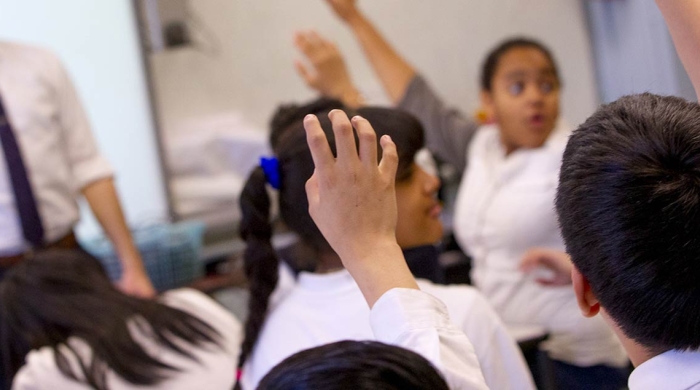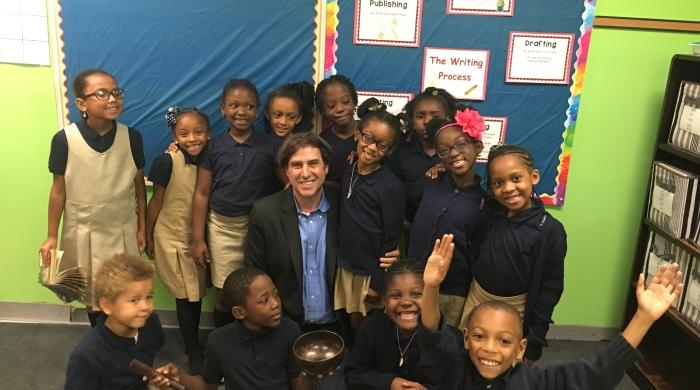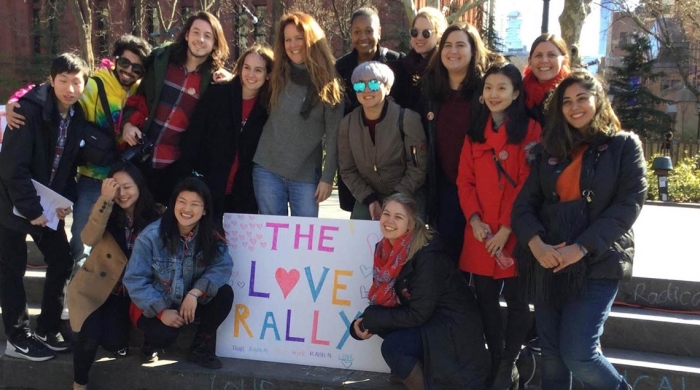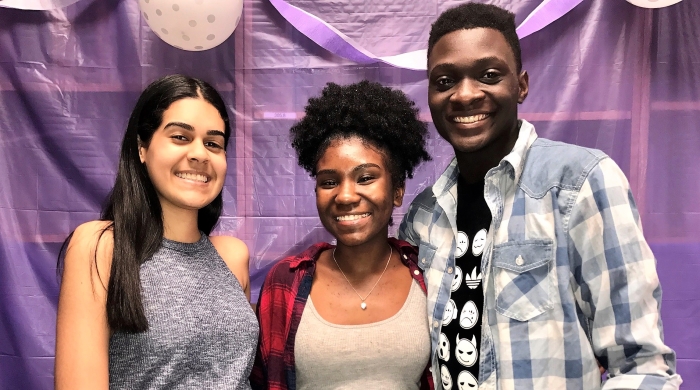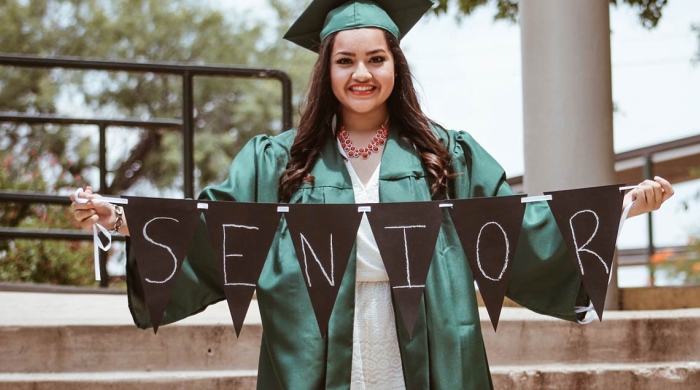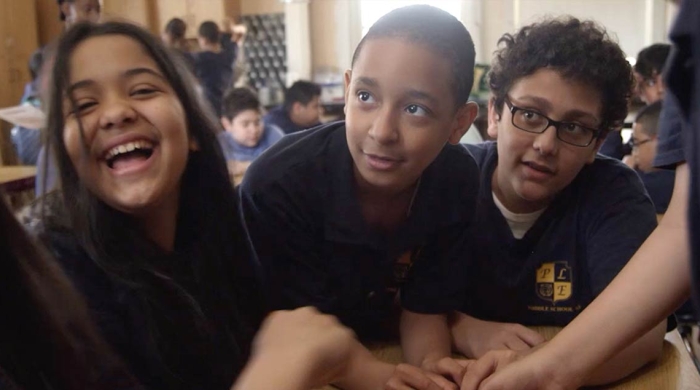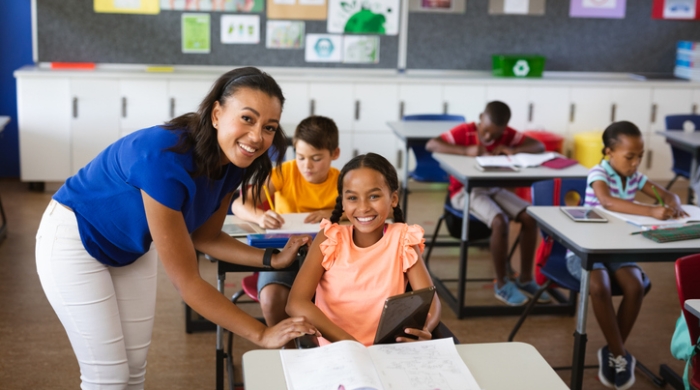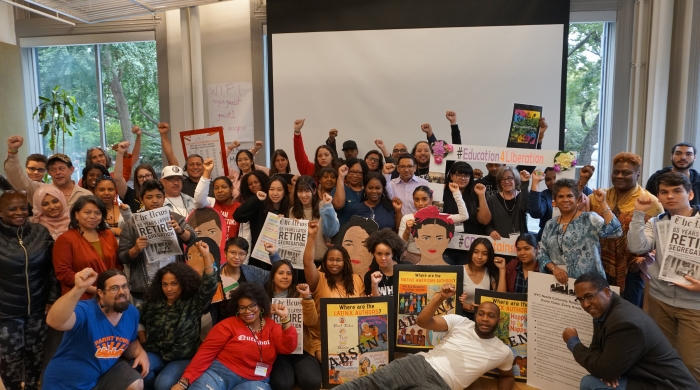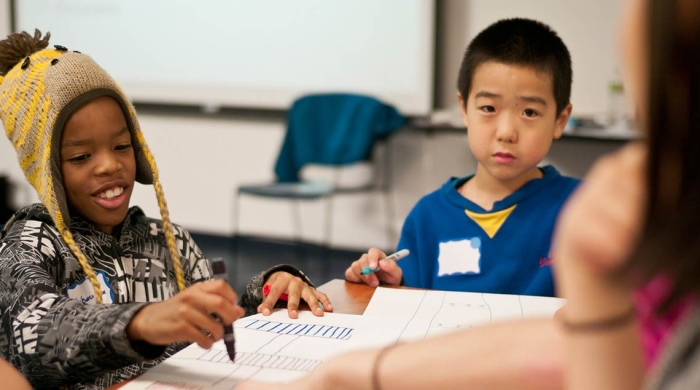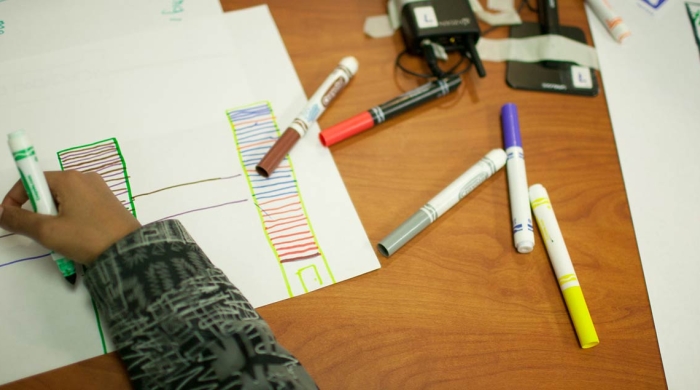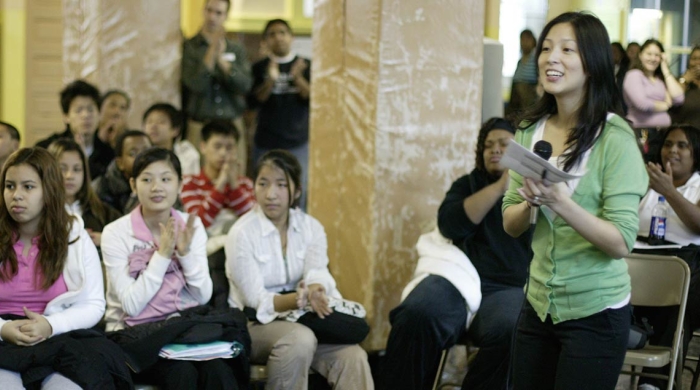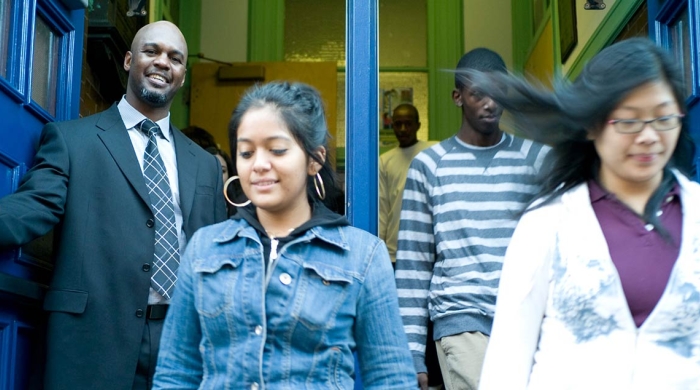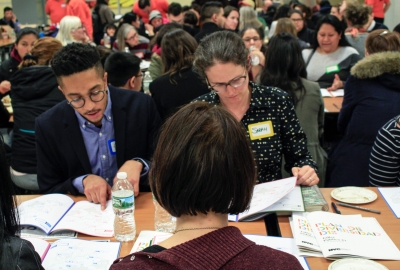
Research and Faculty Projects
Center for Policy, Research, and Evaluation (PRE)
The mission of PRE at NYU Metro Center is to make research and evaluation for education that is action-oriented, liberating, accessible and results in more equitable systems, policies, and practices. Recognizing that research is often used as a tool of domination, we believe in the reclamation of research tools to illuminate marginalized truths, stories, and experiences.
PRE served the following constituencies:
- 350 individuals served virtually
- 14 trainings hosted
PRE has continued to center BIPOC communities in all of our research and evaluation work, using humanizing and participatory methods to tell counter-narratives. PRE’s webinars, trainings, reports, and blog posts include and uplift these communities. PRE also presented on how educators can practice culturally responsive-sustaining family engagement as students returned to school after months of remote schooling.
Through their various research and evaluation projects, PRE has continuously brought people together to share learnings in the pursuit of equity. PRE has convened parent leadership organizations to deepen their racial equity work; youth-serving community-based organizations to learn from one another how to do culturally responsive sustaining work with young people; and brought young people, families, and educators together to co-design research. PRE cherishes seeing the shared learning–and shared questioning–that has arisen in these spaces.
Mindful Education Lab (MEL)
MEL conducts research, teacher training, and service to schools and individual students. MEL research looks at the psychological and neurological effects of mindfulness on student learning, teacher effectiveness, and school and classroom climate. This work, in turn, informs the training of teachers and educators.
- 400 individuals reached virtually
- 750 students served
- 100 parents/community members served
- 300 teachers served
- 4 school leaders served
- 8 trainings hosted
Project for the Advancement of Our Common Humanity (PACH)
The Project for the Advancement of Our Common Humanity (PACH) is a think-and-do tank with approximately 125 affiliated organizations focused on creating a more just and humane world. PACH has worked closely with the Yale Center for Emotional Intelligence, the New Pluralists (a group funded in part by the Rockefeller Foundation), and New York University’s administration (to deliver Listening Project Workshops to various groups within the NYU student and faculty population). Additionally, since the beginning of the Listening Project, they have closely collaborated with teachers to help build the curriculum.
- 389 individuals reached
- 252 students served
- 70 parents/community members served
- 8 teachers served
- 3 How many school-level leaders
- 13 trainings offered
Central to PACH’s philosophy is an attempt to challenge the hierarchy of humanness, which serves to justify the systemic dehumanization of marginalized groups. PACH addresses these hierarchies directly, counteracting stereotypes and challenging norms of masculinity, white supremacy, and capitalism in curriculum and practice.
PACH's biggest success during ‘20-’21 was their continued implementation of the Listening Project in three public middle schools during the COVID-19 pandemic. Despite challenges to their program’s implementation--such as the necessity of remote learning and increasingly limited teacher capacity--PACH adapted their methods and approach accordingly and were able to serve 252 7th grade students in New York City schools.
The Listening Project worked alongside a team of experienced teachers to adapt in-person lessons to an online format that included PowerPoint presentations, visual aids, interactive virtual assignments, and Zoom-based activities. PACH also adapted all data collection protocols to accommodate a virtual format, administering online versions of surveys through Qualtrics and creating an online chat platform for students to interview one another for our behavioral measure assessment.
Additionally, PACH increased efforts to bring their curriculum to schools in response to the COVID-19 pandemic's impact on students’ feelings of loneliness and isolation which worsened the crisis of connection that the Listening Project was designed to address. PACH's emphasis on students’ inherent relational capacities and their efforts to bridge connections across differences seemed especially urgent for adolescents during this difficult and isolating time. PACH received feedback from students and teachers that the Listening Project’s success in building peer relationships among students, as well as student-teacher relationships, was incredibly important during this year.
Explore Our Research and Faculty Projects
Center for Policy, Research, and Evaluation
Conducts applied research and evaluation studies focused on promoting positive educational outcomes for youth, and understanding the influence of both schools and communities on those outcomes.
Mindful Education Lab
Oversees two parallel but connected programs - research and teacher training.
Project for the Advancement of our Common Humanity (PACH)
A think-and-do tank that draws from the science of human connection in order to create a more just and humane world.
Student Development and College Access
College Prep Academy/1199 Workforce (CPA/1199)
CPA/1199 is a supplemental college-preparatory program that enables roughly 300 high school students from high-need communities to attend our central NYU campus for intensive Saturday and summer sessions, focused on academic enrichment, tutoring, mentoring, college readiness, career planning, and professional internship experience.
The impact of the CPA/1199 programming on students' academic performance has been consistent throughout the transition from an NYU on-campus program to a virtual platform. This success is due to the flexibility of services provided to students and parents through funding from the Meringoff, Winston, and Pinkerton Foundations and the ongoing collaboration with the 1199/CCC.
- 379 Students and Families Served during the Program year:
- 225 participated in the Saturday academic year component
- 154 participated in the Summer component
- 100% of seniors successfully graduated high school and matriculated to college with many earning Advanced Diplomas.
- 73% matriculated to a 4-year college
- 27% matriculated to a 2-year college
- 100% of seniors successfully completed financial aid processing
- $376,224 in scholarships, in addition to the Federal and State Financial aid grant awards, received by CPA/1199 participants with the assistance of CPA/1199 staff.
Collaboration with the Department of Teaching and Learning, Applied Psychology, and the Wasserman Center to recruit, orient, train, and supervise 20 undergraduate and 2 Graduate fieldwork students whose service enables us to augment support for students in career and college planning, mentoring, mindfulness, and college prep academics.
CPA/1199 academic services focused on support in Core Curriculum (Math and Science, ELA) through 15 different class periods. These were supplemented through an array of enrichment opportunities which included 10 diverse elective class options such as performance arts, forensic science, social justice, biomedical science, financial literacy and future planning, anatomy and physiology, current topics in investing (blockchain/cryptocurrency), expressive music, and computer technology (gaming/coding/ programming).
Self-development and leadership activities supplement the academic and career and college counseling components. A structured leadership component was provided through the Perceptions of Leadership Research project under Dr. Emily Balcetis, Associate Professor of Psychology at New York University. Students learned through a variety of interactive activities, tasks, and discussions on how to take charge of their learning and understanding through self-awareness, peer engagement activities, and developing important skills needed to facilitate a discussion, process information, and create goals.
Mentoring from professionals, program alumni, and college professionals provided to CPA/1199 participants with the express goal of providing an understanding of the current landscape of careers.
Excel@NYU
EXCEL (Educational eXcellence Creating Empowered Leaders) in Writing, Thinking, and Inquiry (EXCEL@NYU) program, in partnership with Fannie Lou Hamer Freedom high school and Children’s Aid Society, was developed over the last 10 years to address the wide and specific needs of first-generation college-bound students of color in the South Bronx and provide access to the wealth of resources available at New York University. Excel Scholars develop skills in writing, reading, public speaking, and community building through intensive critical literacy and college preparation curriculum and multimodal enrichment opportunities; such as academic conferences, cultural trips, faculty discussion sessions, and college mentoring. By challenging students to become dynamic leaders in their academic community and beyond, The EXCEL Academy aids the transition from high school to college holistically.
- 25 students served
- 25 parents/community members served
- 5 teachers served
- 3 school-level leaders served
- 10 trainings offered
EXCEL@NYU has worked extensively to develop networks where they can share the program’s best practices with broader audiences and learn from other programs. Children’s Aid has incorporated many lessons learned through EXCEL@NYU programming into its College and Career Access and Success programs which fall under its Youth Division. This work has also influenced the agency’s approach to serving college-bound students of color from low-income communities by underscoring the importance of utilizing a network of holistic supports to help them achieve postsecondary success. In addition, they have increasingly taken a trauma-informed approach to our practice by, for example, incorporating elements of social-emotional learning and adding a social worker to the program. As always, they continue to share the success of both the EXCEL@NYU program and the partnership with NYU with other funders and stakeholders interested in college access and success work.
Each year, the program culminates in its annual Radical Futures Showcase and Gallery, meant to provide an opportunity for students to share everything they have learned and worked on throughout the summer. The ‘20-’21 showcase was hosted online–given the pandemic. The theme was "Create Self: Past, Present and Future" and centered youth innovation and creativity as a means to better the future world. Youth shared their art and there was a book talk with Dr. B. Sharisse Moore, author and scholar. Many attendees shared how they were inspired by the youth’s creativity. The event served as a reminder of the importance of the arts and humanities to help heal, learn, and generate hope during heavy times.
The pandemic undoubtedly posed its most significant challenge during the ‘20-’21 year. Excel scholars—like many of their peers across New York City—have struggled since March of 2020 to meet rigorous academic expectations while they adjust to the challenges of learning in crowded homes and their families deal with the economic and health impacts of this crisis. After many active discussions among staff, the EXCEL@NYU program was designed to operate remotely, providing more opportunities for project-based and creative work and incorporating health and wellness activities.
Student retention, mental health crisis, economic stressors, and work completion have been major challenges this program year. Students reported that their reasons for not attending or needing to resign from the program were a result of socio-economic stressors. Many youth reported that they had to take on extra jobs, have lost loved ones, and/or are experiencing mental health issues such as depression and anxiety. Several students reported their need to work to support families suffering due to lost jobs and difficulty meeting basic needs at home. Excel scholars who missed sessions reported challenges linked to grief, mental health, and feelings of hopelessness in response to the loss of a family member. Other challenges that impacted full participation were poor connectivity, inadequate space for learning, household responsibilities (e.g. babysitting), and discomfort with turning on cameras. In response, the program instituted several measures to address these issues.
To address the high rates of trauma EXCEL@NYU utilized a trauma-informed practice as the impetus for implementing a mental health and hygiene component that focuses on self-care and allows participants to develop stress coping skills and use creative expression to reinforce personal values. The Children's Aid social worker used group work and regular one-on-one check-ins to connect with participants. Further, each staff member served as a mentor and point person for a group of students, providing personal attention and sharing resources that can contribute to the personal growth of the young person. This strategy has been broadened to include the family of the student. Periodic phone calls by staff members regarding a student's progress in the program are designed to deepen school/family engagement and ensure attendance and participation. The effects of the COVID-19 pandemic on students and their families have made this a critical component of the program and a means to maintain young people's participation.
The program offered stipends, gift cards and sent self-care gift packages including materials for the program, food, and texts for all students in the program. All staff instituted weekly one-to-one check-ins with students as a way to evaluate their progress and needs. At weekly meetings, staff shared notes and discussed students’ concerns. Social workers on staff referred students to the larger network of supports and services at Children’s Aid. EXCEL@NYU also adjusted online participation which can be a very intense and issue-prone process. They learned that small group and one-on-one sessions are vital to the online learning process, as they encouraged direct engagement with the material and provided a much-needed sense of human connection. Instructors also developed curricular scaffolding to make the work assigned more equitable given technology constraints. For example, instructors utilized platforms easily accessible via smart phones, including Google Docs and Slack to allow students to participate in discussion boards and engage with each other. Additionally, social workers and NYU staff led self-care and mindfulness sessions, offered mindfulness tools, and instituted regular Zoom breaks to combat anxiety and stress.
Liberty Partnerships Program (LPP)
NYU LPP is one of 46 statewide LPPs funded by the New York State Education Department. LPP positions NYU staff, graduate and undergraduate students, and program partners to provide direct services to students in the areas of academic immersion, academic support services, counseling, college readiness, cultural enrichment, employment preparation, community service projects, leadership development, civic duty activities, mentoring, health and wellness, and tutoring.
NYU LPP, having completed the third year of a 5-year contract (2017-2022), has continued to serve vulnerable youth who attend our partner schools in New York City.
NYU LPP served the following constituencies:
- 200 students
- 50 parents
- 3 district-level leaders
- 7 school-level leaders
- 232 training workshops, seminars, and courses hosted
LPP had the biggest success in '20-'21 with the Summer 2021 Program. LPP was able to recruit 54 students for this program, 7 of which participated in a "Landmark HS Teaching Assistant" Training Program.
The Landmark HS students were chosen to work closely with classroom teachers as tutors to students attending mandated summer school. They worked with students, attended school-based meetings, went on trips with teachers and other students who were just in school to get enrichment, and planned with each other and teachers on how to help their peers. The students who participated stated that they took away new learning based on the experience. his was a pilot program suggested by the partner school, and we will take their suggestions as ways to improve the program if provided again in the future. The other 47 students who participated in the summer program chose 6 out of 12 possible courses which ran over 6 weeks. The courses included academic options, self-care and development, as well as career and professional experience.
Program instruction was provided by NYU-student tutors who worked closely with one another and full-time LPP staff to deliver some of the components. Some instruction was also provided by program partners. These partners included The Sneaker Fairy who taught the students Sneaker Design and Tim Tussaint-Martin who guided the students through positive and responsible Social Media Branding. The students participated in 6 weeks of programming and delivered a culminating project to their instructors and group via presentations on Zoom.
LPP was able to provide consistent programming despite various changes to in-person and remote requirements during ‘20-’21. The LPP sub-unit provided constant and consistent mental health check-ins and weekly training for staff, shared any and all opportunities for professional development by partner organizations. LPP staff also provided students with opportunities to express their feelings on critical issues during art therapy and advocacy and provided space to be at ease during mindfulness/meditation and yoga.
LPP staff also participated on statewide LPP committees such as the Socio-emotional/Personal Learning Plans Committee, Empire Promise Youth Summit Committee, and the LPP Statewide Advisory Committee.
Explore Our Student Development and College Access Projects
College Prep Academy/1199 WorkForce
Supplemental college-preparatory program focused on academic enrichment, tutoring, mentoring, college readiness, career planning, and professional internship experience
EXCEL @ NYU
NYU EXCEL Academy is dedicated to creating year-round critical literacy and college-access programming for youth from the South Bronx.
Liberty Partnerships Program
Provides comprehensive services designed to meet the academic, psychological, social and other developmental needs of high-risk students.
School Change and Community Engagement
ASD Nest Support Project (ASD Nest)
The ASD Nest Support Project at NYU Metro Center develops the capacity of educational systems, districts, and schools to support students with autism spectrum disorder (ASD). By focusing on strengths, developing independence and advocacy, and committing to inclusion, ASD Nest helps partners build truly inclusive learning environments.
- 2000 students served
- 400 parents/community members served
- 3000 teachers served
- 15 district leaders served
- 114 school leaders served
- 60 trainings hosted
The ASD Nest team demonstrated extraordinary compassion, adaptability, and ingenuity as they navigated supporting schools through a turbulent year. ASD Nest was able to develop and facilitate remote trainings and consultation that was responsive to the ever-evolving needs of schools. Supporting practitioners as they transitioned to in-person learning, to remote instruction, and back again.
The ASD Nest team also continued a deliberate focus on anti-racism by partnering with organizations to develop their team’s internal awareness and capacity in order to both enable us to deepen our practices in a meaningful way, as well as continue to create and uphold anti-racist culture and practices internally.
In recognition of the ongoing traumas that the school staff and students faced related to COVID-19, the ASD Nest team intentionally modeled and then explicitly taught trauma-informed care responses. Through our professional development and consultation, the team elevated the critical social-emotional needs of students and support methods for educators to establish classrooms that foster safety, understanding, connection, and belonging. We also hosted family workshops that centered their personal experiences and provided space to connect and build community during this time of isolation.
Center for Strategic Solutions (CSS)
The Center for Strategic Solutions (CSS) has developed national expertise in supporting educators, and individuals who have contact and influence in education. CSS supports its partners in considering the impact of race, power, and privilege on the lives of students and their learning trajectories. By offering professional development, technical assistance, consultation, and coaching that delves into the deep historical entanglements of racial inequity, CSS centers the dialogue in developing a shared understanding of the systems that impact our cross-racial, cross-ethnic, and cross-cultural understandings. Engagements are designed to offer multiple points of entry for participants of all backgrounds.
- 200 students served
- 75 parents/community members served
- 1850 teachers served
- 30 district leaders served
- 140 school leaders served
- 255 trainings hosted
During the 2020-2021 school year, CSS maintained rich partnerships while adapting to virtual interactions during the pandemic with an intentional focus on social-emotional health of all their partners. CSS continued to offer more frequent, but shorter sessions in the virtual world and continued to provide spaces for educators and students to share space, share about their experiences, and solutionize together.
Education Justice Research and Organizing Collaborative (EJ-ROC)
Education Justice Research and Organizing Collaborative (EJ-ROC) provides support to public school parents, youth, and community groups that are organizing to improve their public schools. EJ-ROC brings together researchers, data and policy analysts, and community organizers to provide critical research, data, policy, and strategic support for the education justice movement. EJ-ROC aims to maximize the synergy between research and community organizing, magnify the voices of grassroots communities of color, and advance the capacity of organizing efforts to design solutions, make demands, and sustain policy wins.
EJ-ROC served the following constituencies:
- 1,500 parents and community members
- 100 students
- 700 teachers
- 100 district-level leaders
- 100 school-level leaders
- 50 training workshops, seminars, and courses hosted
During the ‘20-’21 year, EJ-ROC launched several new projects and campaigns. From Integration to Anti-Racism: How We Show Up As White Parents, which provides anti-racist training to white parents to help them identify and combat the destructive beliefs and patterns of internalized white supremacy. EJ-ROC launched a national effort to support community organizing groups working for educational equity in the face of attacks on critical race theory. EJ-ROC supported the New York City’s Coalition for Educational Justice (CEJ) and other organizing groups fighting for culturally responsive-sustaining education and family engagement during the pandemic.
EJ-ROC also debuted the Culturally Responsive-Sustaining Education (CRSE) STEAM Scorecard to accompany their CRSE ELA scorecard.
Innovations in Equity and Systemic Change (IESC)
IESC provides professional development, technical assistance, and consultancy to educational institutions in general and special education. IESC’s mission is to advance educational equity by disrupting, dismantling, and eliminating disproportionality through expanding the capacity of educators to implement culturally responsive-sustaining (CR-S) equity-based systems that meet the needs of every student and family.
IESC offers anti-bias and culturally responsive training, equity-based technical assistance provisions, and CR-S assessments that align with the NYSED CR-SE framework, as well as emerging research on coherent systemic solutions for transforming failing schools and districts.
IESC served the following constituencies:
- 109 students served
- 136 parents/community members served
- 136 teachers served
- 32 social workers, psychologists, and counselors
- 109 district leaders served
- 47 school leaders served
- 140 trainings hosted
Two major resources produced during the 20-21 year through IESC include the release of the youth manual, Interrogating, Interrupting and Eradicating Disproportionality through Youth Voice and Action which serves as a Guide for youth-adult partnership in pursuit of educational equity. The other resource is the Culturally Responsive Sustaining Education Assessment Tool which is a self-assessment designed to support districts to develop and invest in culturally responsive school environments for every child.
IESC also continued Café con Metro which offered a space for educators across the country to engage with each other on critical racial equity issues they were facing in their districts and school.
Integration and Innovation Initiative (i3)
i3 partners with districts, schools, and communities throughout the nation to design and develop innovative and equitable solutions to educational segregation through strategic support.
i3 reached a total of nearly 2,000 individuals through training and public events. Of these individuals, i3 served the following constituencies:
- 50 students served
- 50 parents/community members served
- 50 teachers served
- 20 district leaders served
- 10 school leaders served
i3 hosted two centered that centered the 66th anniversary of the Brown v. Board of Education ruling and how this ruling continues to impact education. Both Brown @ 66 and In Solidarity for Integration Townhall hosted and organized by the NYC Integration Coalition which includes Metro Center, IntegrateNYC, the Coalition for Asian Children and Families (CACF), New York Appleseed, nycASID, and Teens Take Charge.
i3’s collaborative efforts also resulted in the COVID-19 and segregation mapping project, Segregation Is Killing Us, and the launch of the New Yorkers for Racially Just Public Schools (RJPS) Coalition.
Metro Learning Communities (MLC)
MLC is a specialized professional development project and is widely known for seminars in facilitative leadership, supporting students impacted by trauma, stress and loss, but it also offers professional learning opportunities in other formats. The project’s core mission is to promote educational excellence and equity for all students through deep and collaborative teacher learning.
- 31 students served
- 11 parents/community members served
- 79 teachers served
- 27 classroom paraprofessionals served
- 20 school social workers and counselors served
- 3 district leaders served
- 23 school leaders served
- 11 trainings hosted
During the ‘20-’21 year MLC reached a diverse group of educators in the New York City area and from around the country providing support via interactive virtual seminars and coaching focused on the challenges of our times and how to best support students, teachers, and families.
A significant accomplishment for MLC in ‘20-’21 was supporting a Queens high school in their desire to continue to work on equitable practices. During the spring, several sessions were held with each group of stakeholders (students, parents, faculty, and leaders ) to examine the meaning of equity in a school environment, what is working and what they can improve at their high school. This work resulted in the development of a vision statement for the high school.
Regional Bilingual Education Resource Network (RBE-RN)
The New York State-Wide Regional Bilingual Education Resource Network (RBERN) at NYU Metro Center provides support for the education of English Language Learners/Multilingual Language Learners (ELLs/MLLs) and students of Languages Other Than English (LOTE) through technical assistance, professional development, resource material development, and translated subject area glossaries.
RBERN served the following constituencies:
- 695 students served
- 3153 parents/community members served
- 2772 teachers served
- 124 district leaders served
- 441 school leaders served
- 1,246 Continuing Teacher and Leader Education (CTLEs) for the professional development participants
- 1,294 Parent Hotline inquiries, concerns, and Civil Rights complaints responded to and resolved
- 697 documents for NYSED OBEWL in 35 different languages translated, some of which are low-incidence languages in NYC, but are spoken throughout NYS
- 165,971 visits to our online bilingual glossaries housed on our website and used by educators in New York state, other states, and internationally.
Additional translation services included translating The NYSED Home Language Questionnaire, which is used to Screen potential ELLs, into 58 languages.
RBERN also translated a 3-part webinar series in five languages for parents and families of ELLs/MLLs with disabilities on how they can support their children at home during remote instruction. In addition, they translated a 6-part webinar series on Mindfulness and Conflict Resolution During a Time of Crisis for parents and families of ELLs/MLLs for them to learn strategies to respond to their children during times of disruption and crisis. These webinars were a collaboration with the NYC RBERN at Fordham University and NYC RBERN and CSTAC at Fordham University, respectively.
Beyond translation services, the RBERN team developed and implemented several programs to respond to the needs of their student, parent, and educator constituencies.
In September 2020, RBERN realized that senior year students were not getting any college information or how to apply for financial aid. In order to address this issue, RBERN in collaboration with the NYC RBERN at Fordham University, developed The Roadmap to College workshops and recruited participants–students and parents–through communication in their home language. This pilot program reached many students who are the first in their family to go through the college and financial aid process. An important component of this pilot program was that RBERN also included information on ways for undocumented students can support apply to college and receive financial aid when accepted. Participants also received one-to-one individualized FAFSA completion assistance. ELLs/MLLs were motivated to continue their education. Parents realized that their child can aspire to attend and graduate from college.
RBERN successfully created a partnership with the NYC Public Libraries (Bronx, Brooklyn, Manhattan, Queens, and Staten Island) to conduct workshops for ELL/MLL parents, librarians and others on topics, such as parent rights, culturally responsive-sustaining education (CRSE), socio-emotional learning (SEL), high school graduation requirements, college applications.
RBERN outreached to cultural and community-based organizations to provide laptops for culturally and linguistically diverse students who did not receive one, as well as to provide funding for Wi-Fi connection to enable them to attend virtual classes.
The team also provided a series of professional development on SEL, Equity, and CRSE for all school educators and focused on how to recognize and leverage inequities, as well as on what teachers can do in the classroom to make culturally and linguistically diverse students feel welcomed. They provided parent/family workshops on inequities that exist, especially with children of color who are learning English as a new language, and how to leverage these inequities. They also met regularly with students who participated in the Puerto Rican/Hispanic Youth Leadership Institute and inspired them to share their voices.
Explore Our School Change and Community Engagement Programs
Nest Support Project
The goal of the Nest Support Project is to partner with public schools to establish inclusive cultures and advance the development and implementation of educational practices for autistic learners.
Institute for Healing and Belonging in Schools (IHBS)
Aims to close equity gaps and improve student outcomes through creative problem-solving, research-driven insights, and tailored strategies. By empowering educators, leaders, communities, and caregivers with the right tools, we cultivate healing-centered, inclusive environments where all students—especially Black and Brown youth—can thrive.
The Education Justice Research and Organizing Collaborative (EJ-ROC)
The Education Justice Research and Organizing Collaborative (EJ-ROC) brings together researchers, data and policy analysts, and community organizers to provide critical research, data, policy and strategic support for the education justice movement.
Innovations in Equity and Systemic Change
The Innovations in Equity and Systemic Change (IESC) provides professional development, technical assistance, and consultancy to educational institutions in general and special education.
Integration and Innovation Initiative (i3)
I3 works with districts, schools, and communities in the United States and beyond to design and develop innovative and equitable solutions to educational segregation.
Metro Learning Communities
Offers professional development opportunities for educators to promote facilitative leadership skills, collaborative learning spaces, data-smart schooling and early career teacher mentoring to improve instructional practices and increase equitable outcomes for all students.
NYS Statewide Regional Bilingual Education Resource Network
Offers technical assistance, professional development and resource materials that strengthens the teaching and learning of students of English as a new language, and students of languages other than English.


